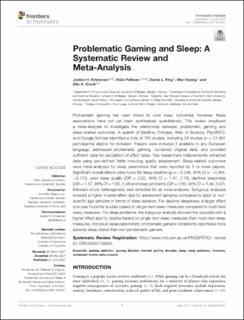| dc.description.abstract | Problematic gaming has been linked to poor sleep outcomes; however, these associations have not yet been synthesized quantitatively. This review employed a meta-analysis to investigate the relationship between problematic gaming and sleep-related outcomes. A search of Medline, Embase, Web of Science, PsycINFO, and Google Scholar identified a total of 763 studies, including 34 studies (n = 51,901 participants) eligible for inclusion. Papers were included if available in any European language, addressed problematic gaming, contained original data, and provided sufficient data for calculation of effect sizes. Two researchers independently extracted data using pre-defined fields including quality assessment. Sleep-related outcomes were meta-analyzed for sleep parameters that were reported by 5 or more papers. Significant overall effects were found for sleep duration (g = −0.238, 95% CI = −0.364, −0.112), poor sleep quality (OR = 2.02, 95% CI = 1.47, 2.78), daytime sleepiness (OR = 1.57, 95% CI = 1.00, 2.46) and sleep problems (OR = 2.60, 95% CI = 1.94, 3.47). Between-study heterogeneity was detected for all meta-analyses. Subgroup analyses showed a higher inverse effect size for adolescent samples compared to adult or non-specific age samples in terms of sleep duration. For daytime sleepiness, a larger effect size was found for studies based on single-item sleep measures compared to multi-item sleep measures. For sleep problems, the subgroup analysis showed the opposite with a higher effect size for studies based on single-item sleep measures than multi-item sleep measures. Across all sleep parameters, problematic gamers consistently reported a more adverse sleep status than non-problematic gamers. | en_US |

